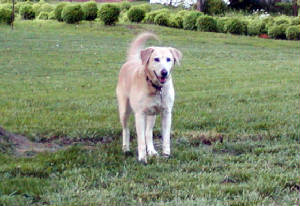In order to ensure that your dog is
a positive candidate for therapy, we require a brief pre-screening session. We want all teams to succeed and to get the most
out of our program. During a pre-screening session, a certified trainer will observe your dog’s temperament, sociability
with humans and other dogs, and basic manners. After the evaluation, our trainer will make a recommendation for your team.
**Please keep in mind that there are many levels and progressions to our services and programs. A basic Therapy
Qualification is a pre-requisite to entry for all of our certification programs, as is a recognized and current Temperament
test.
Based on the pre-screening evaluation the following may be recommended :
-
Basic training. A certified therapy dog must be a master at basic commands.
-
Therapy
Dog Training. After mastering basic obedience manners, your dog begins training to become a therapy dog. This training teaches
the dog and handler how to work together in environments where there Assisted Therapy dog skills as a team can best help.
This includes not only therapy tasks, but also an understanding of policies and procedure.
-
Qualification . Once you and your dog have successfully completed the Therapy Dog Training Class, you will receive a qualification
of completion.
Training
Class
Whether our classes, or anothers, choose classes where the dogs are trained by there handlers under the direction of an experienced trainer in
a manner that is easy to understand and practice at home! Observe the trainers' dog. Do you want a dog that behaves
in the same manner ? Is it a positive example of canine obedience ? Is it social with people and other animals ?
Skills
Attend as many class sessions as necessary
for your dog to develop and demonstrate the ability to work calmly around other dogs and people. A dog who cannot do
this and do it consistently is not ready for therapy dog work. You and your dog will be trained
on how to work through excitement, distractions, noise and food.
Temperament
A dog has genetic tendencies that in part shape
there temperament, as well as the experiences the dog has in life will contribute to its behavior.
There is a wide range of temperaments in
dogs. Some of these charecteristics are not conducive for therapy dog work, while others are a huge benefit.
For example, a dog who is very energetic
and dog aggressive will probably not make a good therapy dog.
Therapy dogs excell when they are social and
comfortable accepting petting from strangers.
THERAPY DOG PREP CLASS
The primary purpose of our fun 7-week
course is to prepare students for involvement with canine assisted therapy dog opportunities. Our course includes training
which will prepare the canine team for involvement with canine assisted therapy programs. This class is not designed to certify
teams but rather to give the teams the skills to become effective and better prepared for Therapy testing evaluations.

